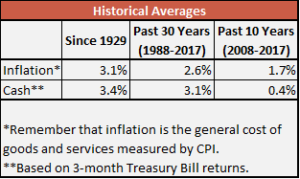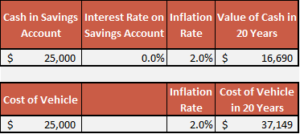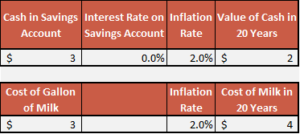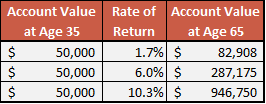Last week and this week are full of me “giving back” to the community. Last Thursday, I attended an Indiana State University Financial Planning Advisory Board meeting where we answered students’ questions and had lunch with some of them, this Thursday I will be at Eminence Elementary School for 4th & 5th Grade Career Day where I believe other middle school and high school teachers may be expecting me to speak to their classes as well, and on Friday I will be participating in Student Day with the Financial Planning Association of Greater Indiana. I have a hard time calling these types of things “giving back”, but that’s what others call them so I’ll stick with it.
Young Professionals
Do I REALLY Need A Budget?
4 minute read
At my job, I come across a lot of people who want to retire but have no idea how much money they need to live on. Not even a ballpark idea. They’ve just lived their life spending and saving without really knowing how much they do of either. I think that most people can adjust to the amount of money that they have available to spend, but sometimes what I estimate they’re spending now and what they’re going to be able to spend in retirement are miles apart. This could be a huge shock when it comes time for them to adjust their lifestyle and start living on much less.
This is one reason why I think it’s important to budget.
Budgeting for Singles
Over the past couple of years, I haven’t been as good at maintaining a budget and tracking my expenses as I would have liked to. It’s hard. It’s time consuming. It’s not the most fun thing to do. Sometimes it can feel too restrictive. Trust me, I get it.
When you’re single, I think that you can get away without having a budget, if you’re frugal and spend wisely. Unfortunately, most young, single people don’t fall into that category. Over the past couple of years, I haven’t used a very strict budget and I was able to save 27% of my income in 2017 and 25% in 2018. I just lived by the principles of frugality and spending wisely. So, I do think that there are people who can get by without budgeting and will be fine in the long-run, but I don’t think there are too many people who are as big of natural savers as I am.
Would I have been able to save more if I had used a budget and been stricter? Absolutely. But personal finance is a balance between living for today and saving for the future. I feel like I’ve done a pretty good job doing both.
Budgeting for Couples
I do think it becomes much more important to use a budget and track spending when there are multiple people involved. There are so many more things going on when there are two people and probably twice the amount of transactions to keep track of. This is especially important if you have separate bank accounts or separate credit cards that you use – it’s good to have all of that information in one place.
A “couple’s budget” not only allows you to have a good idea of where your money goes and who needs money to spend on what each month, but it can also help to keep each other accountable and make decisions as a team about what you want your money to do for you and where it should be allocated.
For those who are married, in a serious relationship where your income is viewed as joint, or who are engaged and will be combining incomes soon, I urge you to sit down and write out a budget. No, it’s not the most fun thing to do, but it will pay off immensely over the long-run. We always hear that money is one of the biggest reasons for divorce in America. Why wouldn’t you be proactive about making sure that doesn’t happen?
Progress, Not Perfect
If you’re not doing any sort of budgeting or expense tracking, then you don’t need to immediately go all in. Whatever you do doesn’t have to be perfect, just do something to make progress. Start with some easy steps and progress from there.
You could start by just keeping track of your spending for a month, evaluate where you felt you spent too much, and then work on it the next month. From there, you could implement a simple budget like the 53/30/20 rule where your after-tax income is allocated 50% to be spent on needs, 30% to be spent on wants, and 20% to be saved. Beyond that, you can use tools such as EveryDollar, Tiller Money, or YNAB. Making things more difficult usually isn’t the right answer because it’s intimidating and mentally fatiguing.
You’re gonna suck at it at first, it’s not going to be easy, and you’ll probably blow completely through what you thought was a realistic spending plan and not meet your savings goals. Don’t let that deter you. Use it as a tool to see where your money goes, evaluate if that’s where you really want it to go and if that’s what really makes you happy, and assess if your current spending is helping you reach your goals.
There are so many things that you want to accomplish and a lot of them probably require money. It’s your choice – you can be intentional and proactive with your resources to make sure that you reach your goals, or you can live life and hope that everything works out.
A little bit of discipline can go a long way.
The 3 Financial Tips Young Professionals Need
4 minute read
Keep The Big 3 In Check
The Big 3 are the 3 biggest expenses that most people have: housing, transportation, and food. Keeping these 3 costs in check will have a much more significant impact on your cash flow than skipping your morning coffee from a shop. Not only will being intentional about keeping these expenses low allow you more flexibility with your cash flow, but it will also allow you to maintain a higher savings rate (the next key we’ll speak about).
A rule of thumb that’s thrown around is that your monthly mortgage payment (including principal, interest, property taxes, and homeowner’s insurance) should be a maximum of 28% of gross income. However, many people fail to recognize this is a maximum. You’re probably already having a third of your income taken for various income taxes when considering FICA, Federal, state, and local taxes. If you’re spending nearly another third on your mortgage payment, then where are you going to get money to save, pay bills, or accomplish your goals?
Stretching your cash flow just to buy the house of your dreams probably isn’t a good idea. Adjusting your mindset and being willing to live in cheaper housing will provide much more financial flexibility in the long run. Once you’ve made a mortgage payment you can’t get it back unless you pay to take out the equity in your home.
Yes, we all want to drive a nice, brand new car, but is it worth sacrificing other goals over? New vehicles are expensive and transportation costs count towards a large part of many people’s cash flow. The point of having a car is to get from point A to point B and a cheaper, but still reliable car, does the exact same job as an expensive one – just not in as much style.
If cars are your thing and you’re willing to make significant sacrifices in other areas of your life to make sure that you’re able to reach your goals, then that’s fine. However, since experiences provide more happiness than things, I prefer to spend part of the money that I would on an expensive car on experiences that I’ll value for much longer and save part of it to help me reach financial independence. Cheap transportation still gets you to where you need to go and provides financial flexibility while doing so.
Cooking at home can be very time consuming, but it can also save a lot of money. The convenience of eating out is relatively expensive compared to buying groceries and cooking at home and can be much more calorically dense. Just consider the amount of meals that you can prepare with the $50 you might spend at a decent restaurant on a date night. Eating out doesn’t need to be cut out of young professionals’ budgets completely, especially if trying new foods and restaurants is something that really makes you happy, but it shouldn’t happen as often as you preparing your own meals. Cutting back on eating out can provide significant savings if it’s something that you do often.
Maintain A High Savings Rate
Starting out with a high savings rate is extremely beneficial to young professionals because of the significant amount of time that we have to invest the money. Additionally, saving a large percentage of your income can help to mitigate too much lifestyle creep and it can provide flexibility in the future when life happens and you’re not able to save as much as you need to.
Maintaining a high savings rate doesn’t mean that you have to save as much as possible or even have a high savings rate every single paycheck, month, or year. There will likely be periods of higher savings and lower savings – what’s important is that your savings rate remains high over time. Most young professionals won’t have pensions available to them and the future of Social Security for younger generations isn’t certain; it’s up to us to be responsible and create successful financial futures for ourselves by saving now.
Develop Good Financial Decision-Making Skills
Keeping The Big 3 in check and maintaining a proper savings rate are great financial habits, but what happens when something pops up that you weren’t necessarily ready for? It could be a financial emergency or a financial opportunity, but either way you need to be prepared to make the right decision for any situation. Having goals clearly stated for what you want your money to do for you can help with this.
How will you react when your car breaks down and can’t be fixed? Will you buy a brand new one that you’ll need to move on from in a few years because it isn’t practical long-term, buy a new car that you know you’ll be able to drive (and enjoy) for the next 10 years, or will you buy a cheaper, used vehicle that still has significant life left in it?
What about if you’re presented with a financial opportunity to help start a business or purchase a home for below market value? It’s important to revisit your goals and see if these decisions fit into them. Even if you’re able to buy it below market value, you probably wouldn’t buy a home if your goal is to find a job in a different city in the next 6 months.
Keeping The Big 3 in check, maintaining a high savings rate, and developing good financial decision making skills can all be invaluable to young professionals in the long run. These skills will not only allow you to develop a solid financial foundation now, but will likely carry with you throughout your life to help you to be financially successful. Money is a tool that we can use wisely to help us reach our goals or something that we can waste away without being intentional with it – I think that making sure it helps us reach our goals is a much better option.
Why Young Professionals Need A Financial Planner
5 minute read
Develop Good Habits ASAP
Developing good financial habits at a young age is something that can benefit young professionals for the rest of their lives. It’s so much harder for those who have been practicing bad financial habits for 10 or 20 years to change them and begin living a different lifestyle than it is to live a sustainable lifestyle from an early age and develop positive financial habits that will lead to a long-term successful financial life. The decisions that you make when you’re young will affect the rest of your life and can make things much harder or much easier, depending on the choices that you make now.
Waiting to work on your personal finances because you think you’ll be in a better place to do so later is a mistake. Not only could you develop poor financial habits that become ingrained in your daily life as mentioned above, but you could miss out on years of saving and extremely valuable compounded returns. Learning to live within your means isn’t the easiest thing to do for many people. There are so many temptations for your money and we live in a world where instant gratification and “stuff” are placed on a pedestal.
How A Financial Planner Can Help
If you’re not sure what financial planning is, then check out this post before you continue reading.
A financial planner can help young professionals use their money to live a life that they love while maintaining financial prudence. They can help to prioritize goals and allocate resources to align with those goals and a young professional’s values.
Yes, there are some people who do everything right financially and don’t need a financial planner to help them. However, there are also people who do everything right financially and still value the guidance of a trusted advisor and knowing that there is a professional who is working alongside them to make sure that they’re making the best decisions for their personal situation.
Young professionals face tons of questions about their financial lives that they’re not prepared to face themselves beyond how much they should save for retirement:
- What if you were to lose your job tomorrow?
- Do you have an adequate emergency fund in place? Where should you keep the money?
- What if you became disabled and couldn’t work? How would you support your family?
- Or, worst case, what if you died? Sure, you might have life insurance in place, but is it enough? Would you want your young children to have full control of all of your assets?
- How much house can you afford? Should you even buy a house right now?
- Do you plan on saving for your child’s college education? How much? All of it? Half? As much as you can without sacrificing your own goals? What’s the best account to save in? How much do you need to save for college?
- What employee benefits elections should you make during open enrollment?
- Should you be paying extra towards your student loans?
- What assets should you invest your retirement account in?
- Should you buy stocks? Should you sell when you see the market in flux and read negative financial headlines? Should you buy that hot stock you heard about on TV?
- Should you invest in a Roth IRA?
- Are there things you can be doing to save money on taxes?
These are all questions that young professionals have that financial planners can guide them through.
Financial Partner
A financial planner serves not only as someone to help young professional with their financial decisions, but also as a coach, sounding board, and accountability partner.
There are so many decisions to be made when you’re young that will have lifelong impacts on your financial life and here are so many people trying to sell young professionals financial products that are exactly what they do not need. it’s really easy to make mistakes. What young professionals truly need is a fiduciary financial planner that always works in their best interest and is there to help them not only build a solid financial foundation, but also to help them along the way as they progress through their life and career.
A lot of people begin their careers only contributing enough to their retirement accounts to receive the match and making minimum payments on their student loans. However, only contributing enough to receive the match means that you’ll probably start quickly falling behind where your retirement savings should be (unless your goal is to work the rest of your life). Once they realize this or get a raise and decide that they want to start doing something more, they have the question of whether they should pay down their debt more quickly or save more.
Starting a career or a marriage with a strong savings rate is one of the smartest things that young professionals can do. Increasing that savings rate each year, even if only by 1% (which you won’t even notice), is a great idea as well that can have a huge long-term impact.
Saving a significant amount of income helps to not only increase your retirement assets, but also directly helps to decrease your living expenses. You don’t want to reach retirement and have to significantly decrease your standard of living because you’ve been spending such a large part of your income that’s not sustainable once you leave the workforce.
A financial planner helps you to think long-term about decisions such as this and prepare for the future while helping you to make choices like saving more or paying down debt more quickly. They are there not only to help you today, but to walk alongside you throughout your financial journey and help guide your path.
Connections
Financial planners have connections to other professionals such as CPAs, insurance agents, estate planning attorneys, realtors, mortgage brokers, etc. who they believe will be the best for your situation. That way you don’t have to worry about if the person who is trying to sell you a product is actually selling you something worth buying. Your financial planner can act as a neutral party and help you evaluate the product or service and give you a recommendation of what’s best for your personal situation.
Lifetime Benefits
Young professionals have a ton of financial decisions to make that they haven’t been prepared for through high school or college. A financial planner can help to guide you through tough financial choices, create goals and prepare for the future, act as a coach and accountability partner, and provide referrals to other trustworthy financial professionals. Waiting to get serious and take control of your financial life is a mistake. Take the steps outlined here to find a trustworthy personal financial planner who can help you make good financial decisions that will benefit you for a lifetime.
You may have access to all of the personal finance information that you need, but there’s no value in information without action and there’s no value in action without knowing the accurate and appropriate action to take to apply that knowledge to your specific situation.
Push Yourself
2 minute read
Being selected as a Board member is exciting for me because it’s a way for me to give back and help young professionals in my community as well as meet and learn from other highly motivated people. It will also be another challenge for me to help further develop my skills as the Board works to secure sponsorships and develop a calendar of events that attracts young professionals and isn’t just more of the same thing that they could get through other groups.
I see this as pushing myself for many reasons. I’m naturally introverted and would be just fine sitting at home by myself after work. Instead, I’ve been pushing myself to get out and meet new people and have conversations to help develop my skills and my network.
I don’t have to make the extra effort outside of going to work every day, but I want to push myself to be better. I always feel a little anxious while I’m on the way to events like these where there are a lot of people that I don’t know and I’m supposed to randomly start conversations with people (especially since I don’t feel like I’m very good at speaking), but that’s part of me pushing myself as well.
As I’ve written before, I’m always motivated by speaking with and being around those who are passionate and come together as a team to accomplish their goal. I love hearing stories about how people have succeeded (and how they are succeeding) and I know that being a member of YPCI’s Board will grant me many more of these opportunities. I’m also sure that I’ll learn a ton from those I’ll be working with.
I think there are plenty of ways that I can help YPCI with my skillset, although I think I’ll receive more benefit than I’ll be able provide. Not only does attending events such as YPCI’s Happy Hours allow you to make new friends and network, but it also helps you develop many other skills such as public speaking, learning to ask questions and figure out how you could help others, and being able to connect those who may not already know each other but could benefit if they did.
I’m looking forward to seeing what we can accomplish in 2019!
Push yourself and make yourself uncomfortable so that you can grow from it.
My two favorite quotes reflect this mentality.
“Success comes from knowing that you did your best to become the best that you are capable of becoming” – John Wooden
The Potential Hidden Cost of Student Loan Forgiveness
2 minute read
PSLF is available to those who work in government or not-for-profit and make 120 consecutive qualifying monthly payments towards their student loans. There are a lot of details around this, but those are for another day. Check the PSLF link above if you’re interested in learning more. To be eligible, an individual must complete the PSLF Employment Certification Form for each year that they worked for an eligible employer and made eligible payments. If all of the requirement are satisfied, then any remaining federal student loan balances will be forgiven.
Income-driven repayment plans tie your student loan payments to your income. If you fulfill all of the requirements, including recertifying annually, then any remaining federal student loan amount at the end of 20-25 years (depending on payment plan) will be discharged.
Keep in mind that these programs are for Federal student loans. You’ll likely end up being responsible for paying all of your private student loans yourself, even if you work for the government or a nonprofit.
Currently, any loans that are forgiven under PSLF are not treated as taxable income. However, loans discharged under the income-driven repayment plan options after 20-25 years of payment are treated as taxable income in the year that they’re forgiven. This is something to be aware of since laws always change and there has been some discussion about this topic recently.
For example, if someone had $100,000 of student loans forgiven under PSLF, then they would not have to pay any taxes on that amount. However, if someone were in the 24% tax bracket and had $100,000 of student loans discharged under a repayment plan, then they could have an extra $24,000 of taxes to pay in that year.
Before using these programs, you should run the numbers to see if it’s worth utilizing them. You could actually end up paying more in payments and taxes than if you were to just pay the loans off more quickly.
To Roth or Not to Roth
3 minute read
Roth vs Traditional
In a traditional 401(k), you contribute money pre-tax, allow the money to grow tax-deferred, and pay the taxes later when you withdraw the money. With a Roth 401(k), you pay the taxes today, allow the money to grow tax-free, and withdraw the money tax-free in retirement (assuming that you meet the Roth withdrawal rules). For someone in their 20s or 30s who plans to retire in their 60s, that could mean 30-40 years’ worth of tax-free growth and subsequent withdrawals in retirement. If the government doesn’t change the laws, the money that you contribute to Roth accounts today will never be taxed again.
What’s the worst that can happen? You pay taxes on your Roth contributions today at your current tax rate and then you pay taxes on your investment earnings when you withdraw the money in the future at your tax rate at that time? That’s likely not going to be much different than making pre-tax contributions today which will be 100% taxable when you withdraw them in the future. A couple with $1 million in a Traditional pre-tax IRA really has closer to $780,000 available to them, if they’re in the 22% tax bracket during retirement.
Consideration of Tax Brackets
If you think that your tax bracket will be lower in the future than it is today, then making pre-tax contributions might be a better option. You’d rather not pay the taxes while in a higher tax bracket today and be able to defer paying them until you’re in a lower tax bracket in retirement.
Conversely, if you think that you’re in a lower tax bracket today than you will be in retirement, then making Roth contributions may be a better option for you. You’d rather pay the lower taxes today than have to pay taxes later in your working career when you’re earning more money or when you’re in a higher tax bracket in retirement.
Personally, my goal is to be in a higher tax bracket later in life than I am today. If all goes as planned, the taxes that I’m paying now are probably going to be lower than those that I’ll have to pay 20 years from now or in retirement. As you continue to make more money in your career you can always switch from Roth contributions to pre-tax contributions to help save money on taxes, if you need to.
Another thing to consider is if you think that tax rates will increase or decrease in the future. If you think they’ll increase in the future, which would put you in a higher tax bracket than today, then Roth would be a better option. If you think that they’ll go down in the future, then pre-tax would probably be a better option.
Combine Both Strategies
Another option is to make 50% of your contributions pre-tax and 50% of them Roth. This allows you to have some tax diversification in retirement which could come in handy. This option would allow you some tax deductions today as well as tax-free withdrawals in the future.
Advantages of Roth 401(k)
The advantages of a Roth 401(k) over a Roth IRA are
1. There isn’t an income limit to make contributions to a Roth 401(k).
2. You can contribute much more to a Roth 401(k) in a year than you can to a Roth IRA.
In 2018, if you earn $135,0000 as a single filer or $199,000 as a married couple filing jointly, then you cannot contribute to a Roth IRA (phaseouts begin at $120,000 for single filers and $189,000 for those who are married filing jointly). On the other hand, there is no income limit to contribute to a Roth 401(k).
The maximum amount of money that you can contribute to a Roth 401(k) in a year is $18,500 for people younger than 50 years old and $24,500 for those age 50 and older. Please keep in mind that any Roth contributions as well as any pre-tax contributions that you make to your 401(k) count towards these amounts of $18,500 and $24,500. Contributions to a Roth IRA are limited to $5,500 for those younger than 50 and are $6,500 for those age 50 and older. As with a 401(k), you are only allowed to make an aggregate contribution of $5,500 ($6,500 for those over 50) to your IRAs.
Contributing to Roth accounts can provide you with great planning strategies and flexibility in retirement. This is a strategy that most young people should seriously look into and consider implementing as a part of their overall financial plan. However, as with almost everything in finance, it depends on your personal situation.
Why Should We Invest for Retirement in the First Place?
5 minute read
The answer to these questions go back to a post that I wrote last month titled What’s the Riskiest Asset Class? In that post, we learned that the riskiest asset class isn’t necessarily stocks; the riskiest asset class is dependent upon your time horizon for using that money. If you plan on purchasing something today, then stocks would probably be the riskiest asset class for that money because a correction or recession could mean the money could lose value. If you plan on using the money for your retirement, then cash could be considered the riskiest asset class, assuming that you aren’t going to retire within the next 5-10 years.
Historically, there’s been a huge opportunity cost to holding cash rather than investing in the market. It is important to have a cash reserve for an emergency fund as well as for short-term goals, but I’m talking about any cash that you have in your bank account above that amount. Specifically, cash that you have earmarked for retirement.
Inflation
Inflation is the rate at which the price of goods and services rises, based on the Consumer Price Index. When inflation rises, your purchasing power, or how much of a good or service you can buy with your money, decreases. Historically, inflation has been slightly less than the rate of return on cash and much less than returns on stocks. However, over the past 10 years inflation has actually been higher than the rate of return in cash.

As we can see, over the short-term our cash hasn’t kept up with inflation while over the long-term it has eked out slightly greater returns than inflation. This means that over the past 10 years the interest rate on your savings account has likely not been high enough for your cash to keep up with the rising costs of goods and services. If you’ve been holding on to a significant amount of cash over the past 10 years, then that money has lost purchasing power due to inflation over that time. Of course, past performance is not indicative of future results, but it’s the best assumption we have in this case.
If you have $25,000 in a savings account today that doesn’t earn interest (assuming you will never add any more to the account or use any of the money), it would be worth $16,690 in 20 years with an inflation rate of 2% (the target inflation rate of the Federal Reserve). However, assuming that the price of vehicles inflates at 2%, the cost of a $25,000 vehicle today would be $37,149 in 20 years.

The $3 that you pay for a gallon of milk would cost $4 in 10 years if it inflated at 2.0% per year while $3 in your checking account that isn’t earning any interest would only be worth $2. These are simply examples, but they demonstrate the importance of making sure that your money keeps up with inflation.

Just imagine what the costs of health care and education would look like, considering they have historically inflated at much higher rates than most other goods and services.
Compound Interest
An even more significant reason to invest for retirement is compound interest.
The S&P 500 (which measures the value of the 500 largest publicly traded companies in the US) has averaged annual returns of roughly 12% (rounded and before fees) over the past 30 years and roughly 12% (rounded and before fees) since data has been tracked beginning 1928. Over the past 10 years, the average annual return of the S&P has been lower than the longer-term averages at 10.3%.

As we can see, in the past, investing our retirement savings in the stock market would have rewarded us generously and would have ensured that our money would grow at a much higher rate than inflation. While the stock market is risky in the short-term, the past shows us that we have to take a long-term view and not worry so much about short-term volatility. The average intra-year decline of the S&P 500 is 14%, according to JP Morgan. Despite this, on average, the S&P 500 has a positive return.
Let’s say that someone age 35 has $50,000 sitting in cash that they’ve earmarked as retirement savings. Assuming that money returns the past 10-year average return of cash of 1.7%, and they never add any more money to it or take any money from it, it would grow to $82,908 by age 65, not accounting for inflation.
Now, let’s assume that they invest that money in the S&P 500 and it returns the past 10-year average of 10.3%. In this case, the $50,000 would grow to $946,750, or over 11 times the amount we see in the example above in the case of cash.
However, most economists and market pundits don’t believe that we will see these types of investment returns from the market going forward. Generally, a rule of thumb that I’ve seen being predicted going forward is 6%. If the person in the example were to invest that $50,000 in the S&P and it returned an average of 6% over the next 30 years, then they would have $287,175 at age 65. This is still almost 3.5 times the amount that the cash would grow to, using the 10-year historical return of cash.

Please note that these are purely hypothetical situations as they don’t account for anyone’s particular situation, don’t take into consideration fees, and are not taking inflation into consideration either.
Historically, there has been a huge advantage to investing for retirement rather than hording cash. Investing wisely could potentially be the difference that allows you to retire early, become financially independent sooner, or live a more desirable lifestyle during retirement than you could afford to otherwise.
The Millennial Mentality
2 minute read
I just happen to be a Millennial and I really wanted to respond to that comment, but I held my tongue (fingers in this case, I guess) because we all know how messy things can get in Facebook comments.
Well, now I’m going against that original thought. Let me explain to you the Millennial mindset and hopefully help clear up some of your misperceptions. If you’re unaware, it’s generally agreed upon that Millennials are those who were born between the early 1980s and mid- to late 1990s (those who are somewhere between age 22 to 40, as of the time of this writing).
First of all, keep in mind who raised the Millennials (looking at you, Baby Boomers and Generation X) before blasting them on Facebook because you believe we’re a generation of those who feel entitled, have never been properly punished, and who have been given participation trophies our whole lives.
We didn’t raise ourselves.
According to research, Millennials are hard workers (if you trust Harvard Business Review and World Economic Forum) who largely have a great understanding of the world as a whole and what the future looks like. We’re the people who are going to be paying into Social Security just to see it go right back out to pay for benefits for the older generations since the Social Security Trust Fund is projected to become insolvent in 2034, according to the Chief Actuary of the Social Security Administration. What was that you said about entitlement?
We also get to inherit the misfortunes of unprecedented amounts of student debt as well as continuously rising rent and home costs, all while facing stagnating and, in some cases, declining wages. Additionally, only 24% of us demonstrate a basic understanding of personal finance. I guess prior generations didn’t think this would be important to teach us.
According to the J.D. Power report mentioned above, “The average Boomer will hit age 65 with just 3.4 years of current income saved, far short of the 10 years some experts recommend.” Meanwhile, “Nearly two-thirds (61%) of Millennials have at least $25,000 in total retirement savings, and 27% of them have more than $100,000, with an average of 30-35 years before retirement.” No participation trophy to be found here. By the way, a pension to look forward to sure would be nice.
If this is the Millennial mentality that we’re talking about, then I think it’s a great mentality to have.
Please excuse us if we don’t want to follow in your footsteps.
The 35-Year-Old with Almost 3X Salary Saved
3 minute read
Last week, I wrote about all of the backlash that MarketWatch received from its Tweet stating, “By 35, you should have twice your salary saved, according to retirement experts”. That same day, I met with a 35-year-old who has saved 2.7 times his salary – compare that to Fidelity’s suggestion of saving twice your salary by age 35. I had no idea this was going to be the case, but I thought it was an awesome coincidence.
How is this possible?
He does have some things going in his favor including that he doesn’t have a significant other or kids. Regardless, I don’t think that should take away from what he’s been able to accomplish. He doesn’t have a large income, but he intentionally keeps his living expenses low which allows him to live simply and save 60% of his income per month. 60%. That’s awesome. He doesn’t mind living on that amount of money because he would rather have a job that he enjoys, that’s flexible to his needs, and that doesn’t cause him too much stress. He values experiences over “stuff”.
On top of that, he told me that he travels to Europe 3 times per year. But, as you could imagine coming from someone who is able to save so much, he doesn’t spend money on lavish trips. Instead, he spends money on experiencing new cultures and focuses on meeting new people. He told me that he’s going to travel to Portugal this year for $231 (that includes his airfare and stay in a hostel) and that he’ll probably travel to Australia and stay with someone who he met while staying in a hostel on a previous trip.
It pays to be resourceful.
I was inspired. If this doesn’t make you think that you can use your resources (money) more wisely, then I don’t know what will.
There are plenty of legitimate reasons why someone couldn’t save twice their salary by age 35, but I’d argue that there probably are also plenty of areas in which you aren’t willing to cut your spending (or increase your income) to do so.
After speaking with him, I started thinking about ways that I could decrease my spending. Not all of them are exactly realistic at this time, but I was thinking about what would hypothetically be possible for me to do which would allow me to increase my savings to 60% of my income.
The first place for me to look is housing since it is my biggest expense, as it is for most Americans. If I had more roommates, then I could not only decrease my rent, but I could also decrease all other utility bills since they would be split more ways. Secondly, I could decrease my grocery bill as I tend to spend quite a bit at the grocery store. I try to eat a relatively nutritious diet which includes fresh fruits and vegetables as well as a lot of protein to support my efforts in the gym. Nutritious food and protein aren’t cheap. I know I could spend a fraction of my current grocery bill if I didn’t care about my diet and bought the cheapest things possible.
I don’t have a vehicle payment, but if I did this would be the next logical step in the progression. Owning a very expensive vehicle doesn’t really do you any favors when trying to cut your expenses and increase your savings rate. A cheaper, but still reliable, vehicle does the same thing as an expensive one.
A lot of money can be saved by spending less on nondiscretionary expenses as well. These are expenses that aren’t necessary, but that you like to spend on and perhaps make your life a little bit easier. Most of us could save money by cutting back on things like eating out, getting a beer with friends at a local brewery, going out to the bars during the weekend, new clothes, buying things on Amazon (that’s a black hole), subscriptions services, etc. I bet you’d be surprised if you wrote all these things down and added up what you spend on these categories in a month.
I was inspired to take a fresh look at my spending habits after speaking with this person and I hope that you are too. Without even going into a deep analysis I know that thee are many areas where I could cut my spending, and maintain the quality of life that I desire, to help me reach my savings goals and reach financial freedom at an earlier age.










